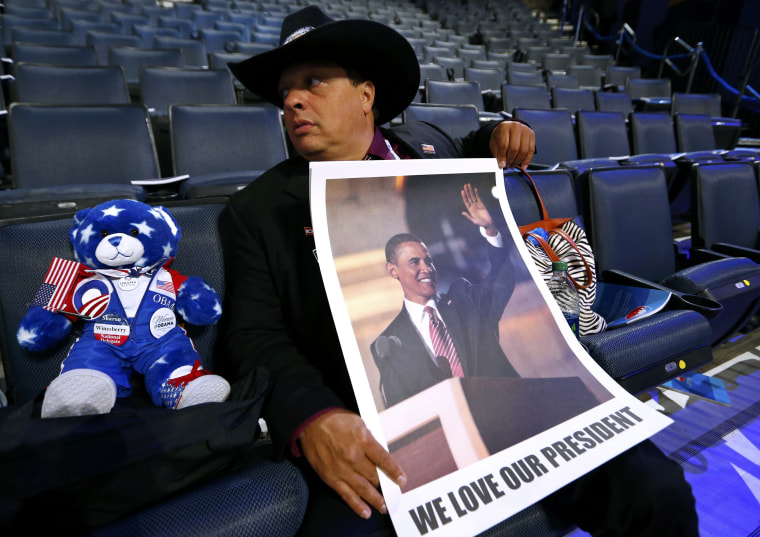The choice of location for any political convention speaks volumes about election-year strategy, and the goal for Democrats in choosing North Carolina was, put simply, to stay on offense – expanding President Barack Obama’s path to a second term and building a permanent foothold in a southern state.
The battleground for the 270 electoral votes needed to win the White House in November encompasses a number of states but, for Obama, winning here in November might mean putting the presidency out of reach for Republican challenger Mitt Romney.
“If Romney doesn't win North Carolina, he's not going to be the president,” said Dallas Woodhouse, the state director for Americans for Prosperity, the economically conservative group associated with billionaire brothers, David and Charles Koch.
The president won the Tar Heel State in 2008, making him the first Democratic presidential candidate to carry North Carolina since Jimmy Carter in 1976. But Obama only won by 14,000 votes – a relatively thin margin out of 2.2 million total ballots cast – stressing the extent to which North Carolina still seems like more natural turf for Republicans in a presidential election.
The 2008 election saw unprecedented voter turnout among African-Americans and students in the state’s “Research Triangle,” a geographic cluster in the northern part of North Carolina, anchored by several major universities. Part of the question in 2012 is whether Obama can recapture the enthusiasm of four years ago.
“We know that it’s going to be close, and it was last time,” said an Obama campaign official in North Carolina, who asked to speak on background in order to offer a better assessment of the race.
The most recent polling showed the race here close, with Romney holding a four-point lead in the latest Elon University/Charlotte Observer poll published Monday.
As with Romney last week in Tampa, where Republicans had hoped their convention would have a pronounced and positive effect on voters in Florida, Democrats are looking to leave Charlotte in better shape for the fall.
Making matters more difficult for Obama are troubles within the state's Democratic Party. Allegations of sexual harassment against a state party official, a struggling economy, and Democratic Gov. Bev Perdue’s somewhat surprising decision against seeking a second term are among the factors that worsen matters for Democrats here. But Perdue was also far from popular, and her decision against seeking a second term arguably cleaned the slate for state Democrats.
“Voters are voting on the president and his record and Mitt Romney and his lack of a record,” the Obama official argued. “So the state party has had no impact on our organization.”
This state is nonetheless battleground turf. North Carolina is among the nine “toss up” states on the NBC News battleground map. The state ranks fourth in total ad spending, according to NBC’s ad-tracking sources, underscoring how competitive the battle for this state’s 15 electoral votes has become.
The Obama campaign and its supporters have spent $22 million in North Carolina so far this cycle, versus $34 million by the Romney campaign and outside groups and super PACs who back the Republican presidential candidate.
That number is only likely to grow thanks to additional advertising dollars being sent into the state to turn voters out to the polls, not just on Election Day, but during early voting periods, as well.
The turnout operation is especially important given the need for Obama to replicate the voter numbers that helped put him over the top in 2008.
“He had a level of excitement that was unprecedented, and I don't see it this time,” said Woodhouse. “When you only win by 14,000 votes, it only takes a small loss of enthusiasm for things to go the other way.”
Putting the Democratic National Convention here in Charlotte is, in no small part, an effort to recapture and harness those passions from 2008, especially in North Carolina. George W. Bush actually won Mecklenburg County – home to Charlotte – in 2000, and Republicans won the Raleigh area from 1996 through 2004. Obama won those areas decisively in 2008, and he drove up his numbers with good turnout in Fayetteville and surrounding areas to the south.
The Obama campaign boasts of having an organizational advantage associated with keeping an "Organizing for America" office open in North Carolina for the span of the president’s first term, and they claim to have gotten a good response to a volunteering initiative that distributed tickets to the president’s speech on the final night of the convention.
And convention organizers are hopeful that they can use this week’s festivities – including Monday’s “Carolinafest,” an event open to the public featuring entertainers like James Taylor, and Thursday’s stadium acceptance speech by Obama – to both recruit volunteers and win over voters.
One convention planner argued that history shows a mixed record for candidates and the site of their conventions; the Obama team believes how they use their convention is just as important as where they place it.
"Where you plop down your convention really doesn't matter, unless you use it wisely,” said the convention planner.
Winning North Carolina – or even staying competitive here – would bode well for the president’s bid for a second term. Obama doesn’t need to win the state, and has plenty of other paths to victory without it. Romney’s math, his ability to secure the 270 necessary electoral votes to win the White House, would be far more difficult without North Carolina. The mere fact that North Carolina is even in the list of competitive states demonstrates the advantages Obama has and the hurdles Romney faces.
Moreover, if Obama is even threatening victory here by Election Day, it will have meant that Romney was forced to spend resources on winning a state President George W. Bush won easily in 2004 despite then-North Carolina Sen. John Edwards being on the Democratic ticket.
